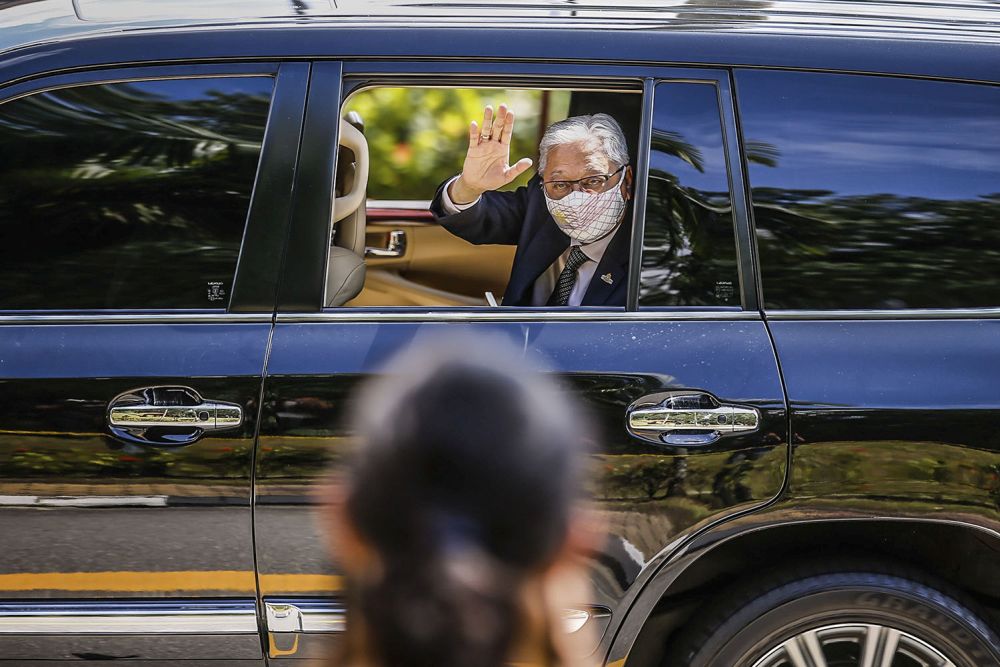Datuk Seri Ismail Sabri Yaakob waves at members of the press as he leaves Istana Negara in Kuala Lumpur August 19, 2021. — Picture by Hari Anggara
KUALA LUMPUR, Aug 20 — Datuk Seri Ismail Sabri Yaakob’s picks for the Cabinet lineup, if he becomes the prime minister as expected, will be his first and likely most difficult hurdle to keep his volatile coalition intact until the 15th general election, analysts said.
Before Ismail Sabri’s nomination, the parties in the hastily-forged pact have clawed at each other in a power tussle that has dragged on for seventeen months and ended with the collapse of the Perikatan Nasional (PN) government led by Bersatu president Tan Sri Muhyiddin Yassin.
That animosity was brought to a temporary halt this week after a truce was seemingly reached between Umno and Bersatu, likely as a result of the splinter party agreeing to take a backseat role as part of a concession made to secure its own political continuity.
But there is always risk that tension could creep up again if Ismail Sabri, one of Umno’s three vice-president, does not institute a power-sharing arrangement that would appease the allies that had helped put him in office.
“Like Muhyiddin before him, Ismail Sabri will remain beholden to his allies who have given him the position,” said Shazwan Mustafa Kamal, associate director at Vriens & Partners, a public policy, government affairs & political risk consultancy.
“Muhyiddin and Bersatu may still play a role in this new government, and allies like PAS and Gabungan Parti Sarawak will want to collect when the time is right,” he added.
“Within his party, Ismail will have to balance between exerting control as prime minister and making sure he abides by Umno’s rules (instructions).”
That itself could prove tricky since this will be the first time a sitting prime minister from Umno is not also the party president.
Observers believe this could fuel mistrust between two factions with competing interests. There are talks that Umno president Datuk Seri Ahmad Zahid Hamidi, whose political clout has waned since he was put on trial for a litany of corruption charges, may feel threatened by Ismail Sabri’s newfound power.
But news that Zahid agreed to back Ismail Sabri suggested that concessions have been made, likely on the understanding that the latter’s position as prime minister would be temporary.
Umno has stated that its support would be conditional upon the agreement that a provisional government would be formed to focus on managing the Covid-19 crisis, and it must immediately call for a general election once things stabilise.
“The fact that Zahid et al backed Ismail despite his actions before Muhyiddin resigned indicates concessions were made, and that Ismail Sabri is unlikely to have complete autonomy or discretion once he assumes the post,” said Shazwan.
Ismail Sabri is expected to face pressure to pick a Cabinet lineup that can regain confidence of a public that was disillusioned with the PN government’s pandemic response.
Speculation that he could nominate Bersatu secretary-general Datuk Seri Hamzah Zainuddin, who was home minister under the PN government, as his deputy has fuelled expectations that his Cabinet may consist of the same people who handled the health crisis with mixed results.
“Granted that is a new government but it’s the same people. It could be seen as a mere Cabinet reshuffle with Ismail Sabri seen on top,” said Oh Ei Sun, senior fellow at the Singapore Institute of International Affairs.
“This same Cabinet will be (seen as the same) as those that screwed up the pandemic response and incapable of reviving the economy. If they continue with this, the popular revulsion will continue or even expand beyond Umno (supporters).”
There is risk that the coalition would crumble from within as parties seek to distance themselves from a government that is seen as struggling with the public health crisis when the general election nears.
“Appointments of those who have experience navigating through crises are important. However, the challenge facing Ismail Sabri is similar to what was faced by Muhyiddin: he must reward his immediate bedfellows for their undivided support,” said Shazwan.
Muhyiddin, who rose to power after Bersatu defected from Pakatan Harapan, formed a Cabinet of 32 members to placate allies and stave off a potential revolt.
PN was said to have a razor thin majority of just 115 seats in Parliament’s Lower House, which the anti-Muhyiddin faction in Umno leveraged to threaten for concessions.
Now, Ismail Sabri could lead the same volatile government susceptible to threats from either Bersatu, PAS, GPS or even within his own party Umno.
James Chin, professor of Asian Studies at the University of Tasmania, said even if it remains intact heading into the next general election, it was unlikely to stay that way once Parliament is dissolved.
Instead, full-blown political rivalry that could end in multi-cornered fights between the three main Malay parties would likely be renewed, he predicted.
“The only reason why Barisan Nasional was able to remain stable for decades was because Umno was the only dominant Malay party. There can never be two dominant Malay parties,” Chin said.
He predicted this would eventually end in a merger of the two as the members of both parties were ideologically compatible.

